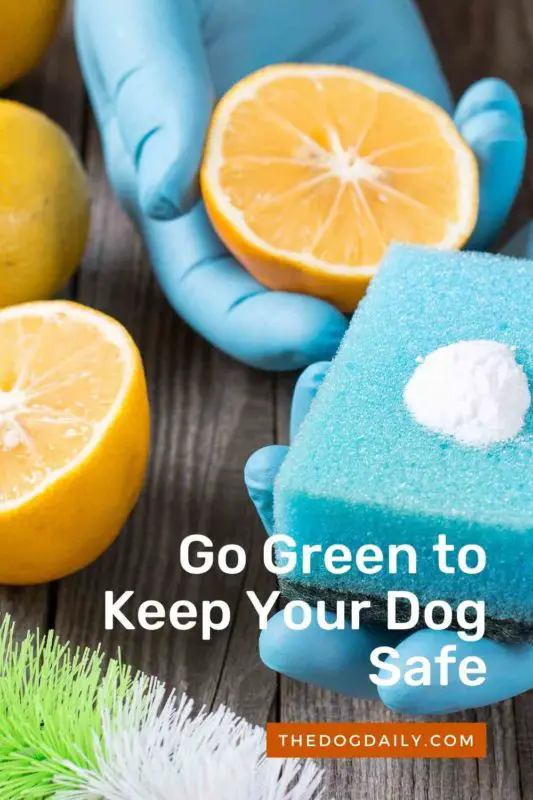Keeping Your Dog Safe by Going Green
They’ll go for a walk. They’ll go fetch. They’ll go down and rollover. But how do you get your dog to go green?
Millions of people are realizing that it’s better for our health to drink filtered water, recycle, and stay away from chemicals and plastics. They’re also starting to realize that a green lifestyle holds some of the same benefits for their dogs.
“A lot of the things you can do are not that hard, don’t require a great deal of effort, and are simple steps you can take to make life more green for your dog,” says Lisa Peterson, communications director with the American Kennel Club.
Toxins in the Home
Your home and yard are likely the places where you and your pet spend most of your time. But while you eat off ceramic plates and drink bottled water, Rover is eating and drinking out of plastic bowls. While you walk around in shoes and sleep in a bed, your dog is walking barefoot on the floor and rolling around on the carpet. Here’s how to handle potential dangers:
-
Replace Plastic Dog Bowls
With all the recent hysteria about the potential health impacts of Bisphenol A (BPA), a compound used to make many plastic water bottles and baby bottles; it may be time to look at your doggie’s dishes. Replace water and food bowls made of plastic and use stainless steel dog bowls instead. Studies show BPA may be an endocrine disrupter, meaning it can alter the body’s hormonal system.
-
Change Your Floor Cleaners
“Think about what you use on your kitchen floor. You may want to go with something more natural,” suggests Peterson. Although the floor may look clean to you, keep in mind that some dogs lick the floor when you drop food, and these cleaners may be harmful to your dog. “The bottom line here,” adds veterinarian Michael Fox, Ph.D., B. author of over 40 books and the syndicated newspaper column Animal Doctor, “is to go back to basics for cleaners, such as white vinegar and baking soda.”
-
Rid Your Home of Deodorizers
Room fresheners, plug-in deodorizers, and cleaning supplies with fragrances can be harmful — especially to pets that may accidentally eat or lick such things. Air fresheners can contain varying amounts of phthalates – compounds that the Centers for Disease Control found may cause cancer, hormone abnormalities, and other health problems. Natural ways to freshen the air include:
-
- Use baking soda to absorb odors.
- Take the trash out every day.
- Boil a sliced lemon.
-
Use Filtered Water
Your family may prefer drinking filtered or bottled water rather than plain tap water. Fox suggests that you may want to take the same precautions for your pet. Using a water filter will get rid of any chlorine or fluoride in the water.
-
Avoid Harmful Lawn Products
Landscapists may use pesticides, deer repellents, fertilizers, and plant foods that are chemical-based and can be hazardous to your dog’s health. Some of these chemicals are known carcinogens. She suggests working with landscapers or garden store staff to find more natural solutions to common yard problems.
Dangerous Dog Medications
Fox recommends seeking out a holistic veterinarian if you want to help your pet “go green.” There is a searchable list on the American Holistic Veterinary Medical Association Web site.
Watch out for flea and tick medicines. The U.S. Environmental Protection Agency (EPA) is intensifying its review of these products, particularly topical products applied to the skin, after recent upturns in complaints about adverse reactions from pets. These reactions range from skin irritation to seizures, and in some rare cases, death of the pet. Fox recommends natural anti-flea and tick remedies, including:
- Combing your dog regularly with a fine-toothed flea comb to remove ticks and fleas
- Vacuuming daily to remove eggs and larvae
- Putting brewer’s yeast and vitamin B complex supplements in pet foods as a natural repellent
- Using natural topical repellents, such as lemon and eucalyptus
Everyday household products, from rug cleaners to chew toys, can also be harmful to your dog. It’s essential to look for adverse reactions. “If your dog all of a sudden starts itching, scratching, or biting its paws, you can play doggie detective,” Peterson says. “Ask yourself, ‘Did I just use a new rug cleaner or sprinkle something on the rug?’ The product itself may be safe, but individual dogs may have a reaction to it.”
Article written by Author: Elizabeth Wasserman

